Long Search Leads to Seattle Insight Meditation
Society’s New Home in Seattle’s University District
Written by: Susan Alotrico
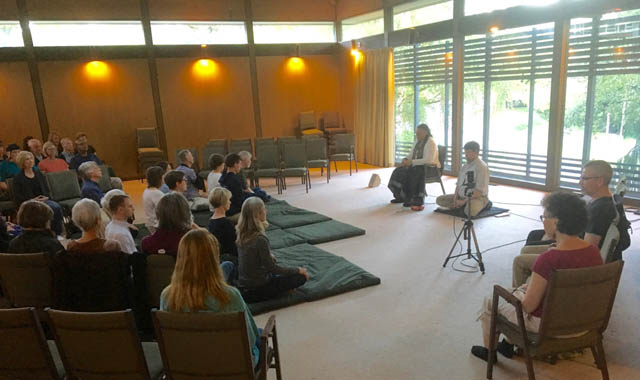
Guiding teachers Tuere Sala and Tim Geil together led the sangha on the first evening at the new practice Center.
Barbara Erwine, Rob Long, Steve Wilhelm
Seattle Insight Meditation Society has moved to a new and more central Seattle location, sharing space at the University Friends Meeting House near the University of Washington.
As many meditation groups around Seattle have come to know, sharing space has become a vital necessity as property values climb. The new site is shared with University Friends, a Christian denomination also known as Quakers.
The move will provide new opportunities for people to engage in the Buddhist practice of vipassana meditation, also known as mindful or insight meditation.
During the last five years Seattle Insight Meditation Society, also knowns as SIMS, has practiced in the lower floor of a south Seattle office building, a space made available by a generous sangha member. That building was located in a predominantly industrial area south of downtown, known locally as the SoDo area.
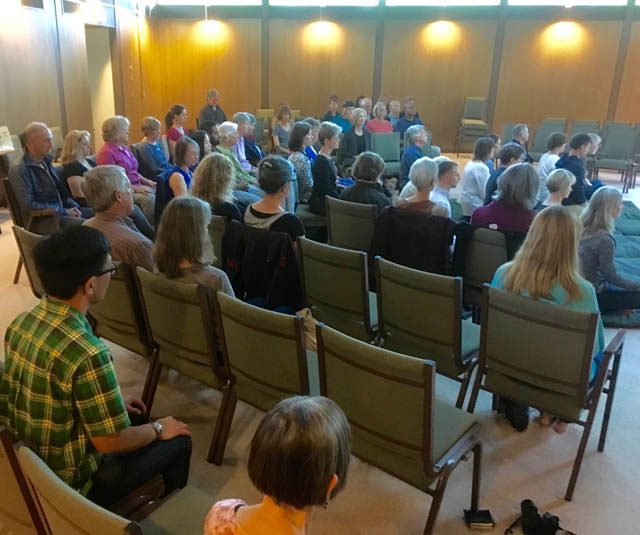
On June 3 the sangha held its first program at its new home. More than 50 people sat in silent meditation as the setting sun reflected off windows and greenery outside.
Guiding teachers Tim Geil and Tuere Sala encouraged the group to gladden the mind by being open to possibilities rather than setting up barriers to engaging in life.
“We don’t know what kind of struggle, or frustration or just difficulty that we are going to have in the future,” Sala said. “Without a gladdened mind, without an uplifted spirit of joy and possibility, then it begins to wear on us.”
She concluded by summarizing Rumi, a 13th century Persian poet and mystic.
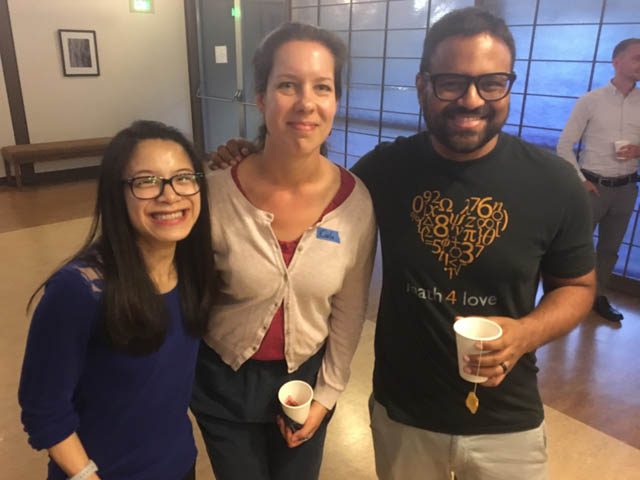
“It’s not your job or your responsibility to seek out love. Our job, our responsibility, is just to seek and find all the barriers that prevent us from seeing love… that already exists around us.”
Geil pointed to the change as precious because of its newness.
“Now that we’re here, it’s really helpful just to rest in that sense of newness, the sense of unfamiliarity that we’re bathed in,” he said. “There’s actually something very sacred there, there’s a mysteriousness that we can rest into.”
Embracing newness is an essential Buddhist practice that invites us to meet things as they actually are in this moment. At the center of Quaker practice is a form of silent contemplation that has some similarities with Buddhist practice.
After the program people enjoyed refreshments, and reflected on the sangha’s new situation.
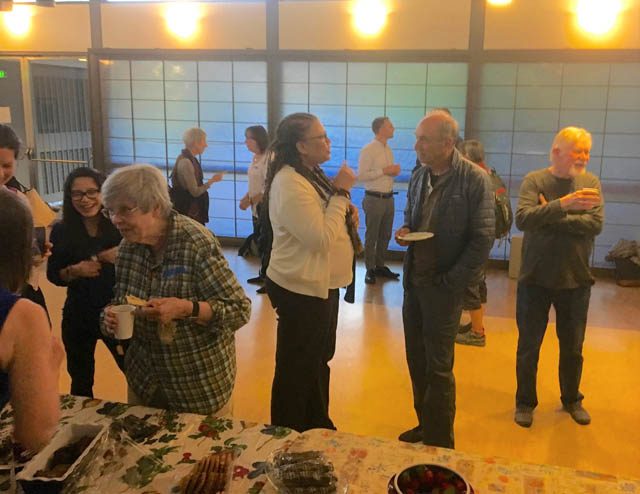
Carla Penderock, who commutes from south Seattle, said she thought getting to the new location would be challenging.
“But I walked from the light rail today and it was so beautiful along the Burke Gilman trail. So, I really felt the sense of adventure Tuere was talking about,” Penderock said. “I really like the room we sit in, the round configuration of chairs… love seeing the trees.”
Tessa Nesbit reflected on Geil’s reminder how Buddhism and meditation can help the nervous system unlearn anxiousness, and live in a way that’s not so fear-based. She also appreciated Sala talking about coming from a place of gladness.
“She talked about YouTube babies laughing. …It made me think of puppies… I could think of puppies any moment and it gladdens my mind,” Nesbit said. “Sometimes I think Buddhism can seem so complex and difficult to wrap my mind (around)… it doesn’t have to be.”
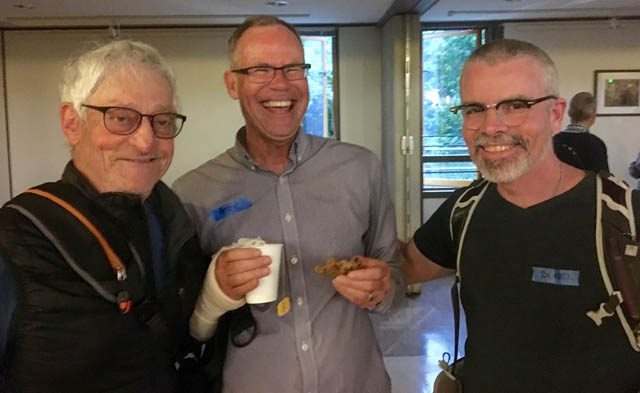
Moving was a group effort for the sangha, with more than a dozen volunteers sorting, packing and moving over Memorial Day weekend. In the process of downsizing SIMS had to shed some items, such as books, which were donated to sangha members.
Sangha members reflected on the change throughout the weekend.
“I know the team who found the location worked very hard to find a central location,” said Ken Yasuhara. “I do wish it were more central.”
“I’m a little sad for the move,” said Ron Corley, who lives minutes from the prior SoDo location. “I share a car with my son so it gets a little complicated.”
Iris Antman, active in the SIMS Climate Change Action group, spoke about University Friends site with anticipation.
“It already has spiritual vibes going strong as well as climate change vibes, because 350 Seattle meets there,” Antman said, referring to a local climate change action group.
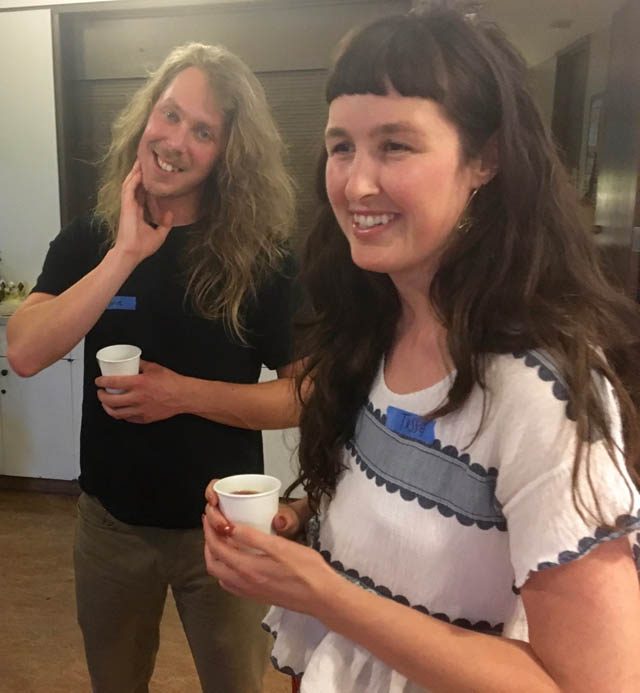
SIMS’ journey from SoDo to the University District took a long and convoluted path. After learning in the spring of 2017 they had to vacate their SoDo home by June of 2019, the SIMS board decided to try to purchase a central Seattle building as a permanent home. The search involved a grassroots effort and a traditional real estate search, within a target area of 3 miles from Seattle’s downtown.
The SIMS board considered more than 50 properties, researched 30 of them, and presented five offers (none of which resulted in a sale). The search was made even more challenging by Seattle’s tight, expensive and aggressive real-estate market, and by city zoning requirements for parking and assembly use.
As the team continued looking, the radius of the search expanded farther away from a central location. But the nearing lease expiration date was making it clear that a property purchase was not to be.
Finally the SIMS board reached the difficult decision to suspend the real estate search. SIMS began a rental search and found a complementary organization that would share its building.
SIMS Board President Barbara Erwine expressed gratitude for the partnership.
“University Friends follows a Quaker spiritual path that is grounded in silence, similar to SIMS,” she said.
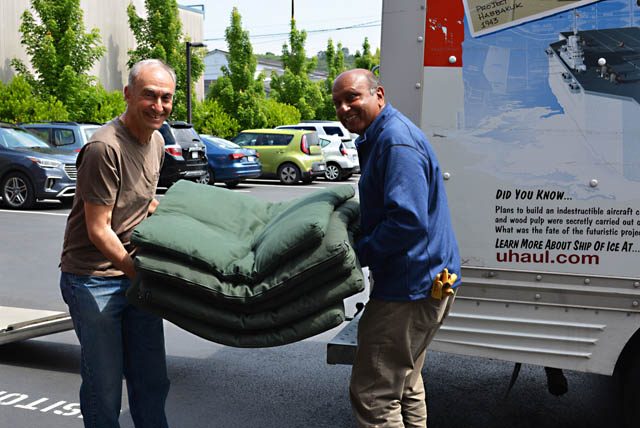
Reflecting the impermanent nature of things, SIMS continues to meet logistical challenges for some of its programs. For starters, SIMS had to move its weekly 7 p.m. meditation program to Monday nights, from years on Tuesday nights, to meet the needs of the Friends community.
The Monday night program includes a 40-minute silent meditation followed by either a dharma talk or a small-group discussion and Q & A.
Some Sunday SIMS programs won’t mesh with University Friends’ own schedule, and the SIMS team in now searching for a location to host its weekly, family-friendly Sunday sit, and its Under 40 group, held on alternating Sundays. These programs are paused until a new schedule and location are finalized. Please watch the SIMS website for schedule and location updates.
Over the years, to meet the diverse needs of practitioners, SIMS has grown from a single, weekly gathering under the guidance of one lead teacher, to a web of practice groups across the Pacific Northwest.
These programs are led by guiding teachers, local dharma leaders, and peer practitioners. They include a Thursday morning program for early risers, and regional programs: Bainbridge Island, Capitol Hill, Eastside, University District, and Whidbey Island. Newcomers to meditation are encouraged to take a six-week introduction to meditation class, which is offered quarterly.
The opportunity for deeper practice is offered through nonresidential retreats held over the weekends at other locations such as the Bastyr University campus, which is north of Seattle in Kenmore.
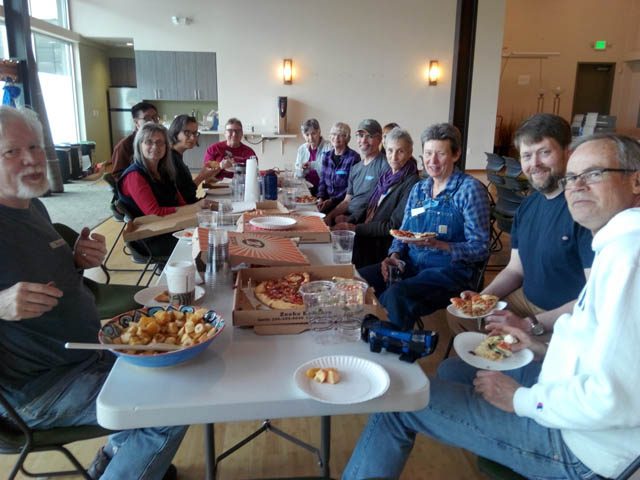
SIMS’ mission is to offer the Buddha’s teachings on insight and awareness to all who seek them, and to support a spiritual community centered in the Pacific Northwest.
The meditation practices taught at SIMS are rooted in the Theravada tradition, which emphasizes insight or “clear seeing” into the true nature of things. SIMS is a nonprofit organization founded by a group of longtime practitioners. It was led by founding teacher Rodney Smith for more than 25 years.
There are many ways to connect with the SIMS community. The best ways to learn more are to visit the SIMS website, to sign up to receive its quarterly email newsletter, and to check out the volunteer opportunities.
Susan Alotrico has been practicing insight meditation with Seattle Insight Meditation Society since 2008. Her commitment to practice grew serving from 2012 through 2015 in the Peace Corps service in Buddhist-infused Thailand. She is a local dharma leader with SIMS and a substitute teacher with Seattle Public Schools, where she gets to spark mindfulness with children.
